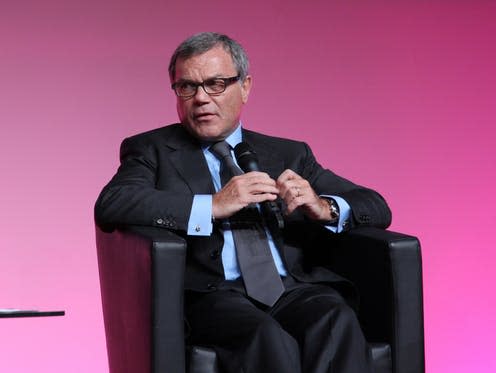Martin Sorrell leaves WPP with stormy waters ahead for the ad industry

The abrupt news that Martin Sorrell will step down as head of his advertising empire raises many questions for his 200,000+ staff, but also for the advertising industry as a whole. Anybody who has dealt with Sorrell (myself included) will be in no doubt of his ferocious grip on numbers, his ability to rapidly read and retain the bigger pictures emerging from them, and his ruthlessness in acting upon this information.
From humble beginnings, he successfully created, developed and profited from the world’s largest marketing services conglomerate over 33 years. Sorrell is undoubtedly a titan of the industry. But it is an industry – like many others – that is rapidly changing. And it could be the case that he’s jumped ship before it sinks.
The WPP construct was simple. It aggressively acquired other advertising agencies. Then it increased its breadth to cover multiple marketing services, with every conceivable offering including media, research, digital, design, event, sponsorship and many more. It also added more clients to the roster – aggregating to a value of £15 billion today. Every agency was ridden hard to grow revenue and profit, with ever tougher reporting requirements.
Through the 1990s, some big clients became anxious at resources being duplicated across multiple agencies. Sorrell responded by offering multidisciplinary, multi-agency teams that were client-centric. So Ford had a bespoke cross-agency WPP team called Blue Hive and HSBC was given its own “team HSBC” led by the agency JWT and involving people from many others. These offered international clients a dedicated one stop shop, combining talent from many agencies – all the while garnering substantial fees and locking in those clients with huge switching costs.
Kiss and punch
When agencies struggled to cooperate, Sorrell’s mantra was “kiss and punch” – each company had to fight its own corner. The result was that whoever came out on top, WPP won.
As the digital economy emerged, so WPP added digital, social and analytics agencies to its fold – apparently keeping abreast of the times, staying at the top of its game. But it was starting to creak.
In the late 2000s, WPP firms I worked with were discussing other industries facing disruption and wrestling with “ownership” of their clients’ consumers. They were struggling to find their identity in multi-agency, client-facing constructs, jostling for supremacy with clients.
Agencies had also started to collaborate with new world digital giants like Google and Facebook, without realising they were giving away more know-how than they were getting in return. All the while, these giants were quietly weaving themselves into the fabric of online media.
Meanwhile, millennials emerged. They consume less traditional media, want instant gratification, without having to pay for it, have less brand loyalty and rely more on peers than traditional advertisements. Marketing-heavy firms are ever-more-closely scrutinised, their budgets squeezed.

Suddenly we wake up to see that the two biggest receivers of ad-dollars are Google and Facebook. The two biggest providers of data, of many services, channels, techniques and technologies are Google and Facebook (unwittingly aided and abetted by the great online public). Clients are welcome to deal direct, thereby cutting out the expensive, antiquated agency groups. The business that talked about disruption was itself disrupted.
Big spenders on advertising like multinationals P&G and Unilever now question traditional agency roles. Stakeholders inside and out question WPP’s hierarchical structure and astronomic CEO remuneration; activist investors are strangling marketing spends. WPP’s share price slide of a third over the last year comes as a consequence of these disruptions and a warning of choppy waters ahead. The allegations surrounding Sorrell may be the straw that broke the camel’s back.
Writing on the wall?
Like many highly ambitious, smart people, Sorrell’s consummate skill brought with it an autocratic streak – he was loathe to allow others too close. WPP has had a much-commented lack of succession planning, which is perhaps as telling as it is damaging. As a shrewd operator, the ex-CEO may have seen the writing on the wall and exited before the behemoth crumbles further.
Some observers (including Sorrel himself) point to the many highly competent people at WPP, with very talented, creatively adept leaders in its various divisions. Plus, the big global consultancy firms are now buying agencies so the return on investment must be good. Agencies have evolved rapidly and continuously since before the Mad Men era – they can surely do so again.
But many others believe this is the end for the holding company model. There are worries too for WPP’s rivals, Omnicom, Publicis, Interpublic and Dentsu, who some argue are even further behind the new wave of advertising. It is more likely that WPP will break up, its operating companies sold off, the model in tatters.
The new tech giants, such as Google, Facebook and Alibaba, will clean up. And they will probably eliminate many traditional media, creative and digital agencies in the process. I wish the people of WPP well, but think the rot is too deep and its corporate evolution too slow for this age of disruption.
This article was originally published on The Conversation. Read the original article.

Donald Lancaster does not work for, consult, own shares in or receive funding from any company or organisation that would benefit from this article, and has disclosed no relevant affiliations beyond their academic appointment.

 Yahoo News
Yahoo News 
